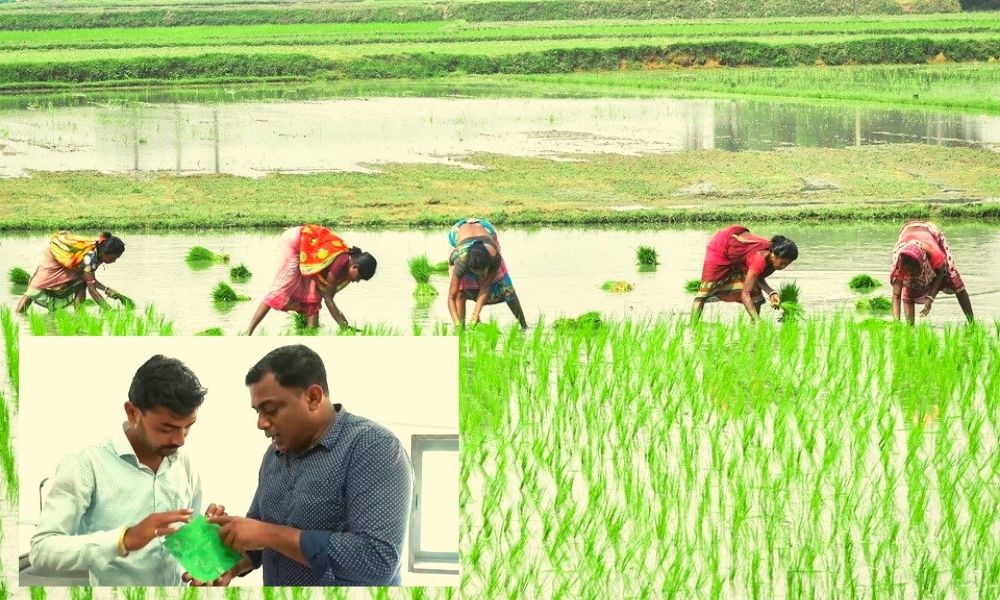Boosting Productivity! Ex-NASA Scientist Develops Affordable Sensor For Farmers
Writer: Tashafi Nazir
For most people, journalism sounds hectic and chaotic. For her, it's a passion she has been chasing for years. With an extensive media background, Tashafi believes in putting efforts on presenting a simple incident in the most interesting way.
Maharashtra, 17 July 2021 10:26 AM GMT
Editor : Sanal M Sudevan |
Keen to explore new things and learn something new every day in the field of jounalism.
Creatives : Tashafi Nazir
For most people, journalism sounds hectic and chaotic. For her, it's a passion she has been chasing for years. With an extensive media background, Tashafi believes in putting efforts on presenting a simple incident in the most interesting way.
The sensor can now be availed at Rs 10,000 by the Indian farmers, which otherwise used to cost Rs 1.5 lakh each.
Parag Narvekar, an ex-scientist at the National Aeronautics and Space Administration (NASA), has developed an affordable sensor in Nashik to boost crops production in India. The sensor can now be availed at Rs 10,000 by the Indian farmers, which otherwise used to cost Rs 1.5 lakh each.
"It'll help farmers understand fertiliser and its usage and irrigation depending on the current weather condition," Narvekar told news agency ANI.
He experimented with the technology and developed the sensor with the help of Vilas Shinde, the chief managing director of farmer producer company Sahyadri farms.
Sahyadri farms are the country's largest farmer collective in the fruits and vegetable sector that aims to transform the structure of traditional Indian farming. It started with a mission to ensure that the small-landholding farmers of India are given fair compensation for their produce and labour. It's a collective that is owned and managed by farmers and guarantees adequate equity to everyone while providing value to the end consumer.
Affordable Technology
The scientist said that the developed countries like the US and Europe have various technologies available in the agriculture sector. However, there was no such technology available in India to deal with crop production in accordance with global climate change.
"After working at NASA, I decided that I should do something for my country. Agriculture is the backbone of the country. The farmers cannot afford such technology, hence I experimented with developing an affordable technology. Finally, I executed the plan last year," he added.
While informing about the newly-developed sensors, he said they could help recognise suitable timings for irrigation, keeping in view the weather conditions, farmers' decisions for better crop quality, the fertiliser that can be used, medicines for crops, and agricultural practices need to be followed.
Moreover, the sensors could also be used for weather forecasting through satellite data sets and linked with an agro advisory to update weather developments. The farmers could check out the weather in the nearby areas once they put the sensors at their farms.
Shinde explains a need for standard quality sensors from six to seven years that could give data accuracy and affordability.
"We worked on the sensor for the last three years. The sensors could be placed on the farm or at the farmer's place, instead of the old sensors that could be placed only at the village level", added Shinde.
Big Boost To Farmers
Explaining the benefits of the sensor and how it is proving to be helpful, Ramesh Gunja, a farmer working at the Sahyadri Farm said, "We can understand about the rain prediction and its percentage in advance and can prepare ourselves accordingly. This also helps us know the medicine to be sprayed on the crops. We get the confidence before deciding to proceed with our work and wastage can be avoided due to the rain. We can make sure that the right thing goes at the right time."
In India, the farmers have been using sensors over the years in precision agriculture to impart data that helps farmers monitor and optimise crops and keep up with changing environmental factors. By positioning sensors, farmers can understand their produce at a micro-scale, sustain resources, and reduce environmental impact. The most prominently used modern tools and sensors used in the agriculture sector in India are the location sensors, optical sensors, electro-chemical, mechanical, dielectric soil moisture sensors and airflow sensors.
Data shows about two-thirds of India's 1.3 billion population relies on farming for a living. Still, most small and marginal farmers have limited access to advanced technologies or formal credit that can help improve output and fetch better prices.
According to a study by consulting firm Accenture, digital farming technologies and services, including sensors to monitor cattle, drones to analyse soil and apply pesticides, can improve yields and significantly boost farmers' incomes.
Also Read: Andhra Pradesh: Scientist Develops Cheaper Sewage Disposal For Railways
 All section
All section















